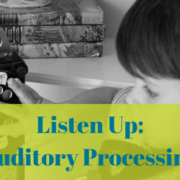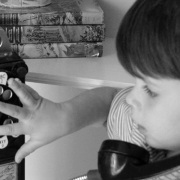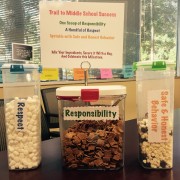Listen Up: Auditory Processing
It is Audio Appreciation Month! September reminds us to be grateful for an ability that some of us may rarely think about: the ability to hear. Of course, we hear sounds all the time. We are constantly receiving inputs from the environment, but the ability to absorb and process sound is actually quite complex. The process involves the outer, middle, and inner ear structures, as well as hair cells and the auditory nerve that transports information to the brain.
Additionally, a surprising fact about hearing is that, “the human ear is a fully developed part of our bodies at birth and responds to sounds that are very faint as well as sounds that are very loud. Even before birth, infants respond to sound” (American Speech-Language-Hearing Association). While in utero, babies are able to hear sounds from within and outside of the womb. The auditory pathways, however, are still immature at this stage. This means that, while the baby is able to hear, processing and perceptible abilities have not fully developed.
The magical aspect of the development of the auditory system is its plasticity, especially when considering our constantly changing environments and experiences. The auditory system is regularly adapting to process the various inputs we receive at any given moment.
But what happens if there is a glitch in the system? Since the auditory system stretches way beyond simply hearing, the ripple effect could greatly impact other areas of development.
Since hearing is a large aspect of human communication, obstacles related to hearing impairments may impact a child’s educational development. Specific areas of concern in the classroom for children with hearing impairments include:
- mastering that subjects of grammar, spelling and vocabulary
- taking notes while listening to lectures
- participating in classroom discussions
- watching educational videos
- presenting oral reports
The complicated aspect is that a hearing issue may not be related to the actual hearing process at all. Instead, the auditory system may be impacted by a processing impairment. Auditory processing disorder, also called a central auditory processing disorder, is sometimes difficult to identify. Symptoms of APD are strikingly similar to symptoms of Attention Deficit Hyperactivity Disorder (ADHD). APD and ADHD can coexist; however, the slight distinctions between the two disorders are sometimes overlooked, resulting in misdiagnosis. Since symptoms of ADHD and APD are so similar, it is imperative that a child’s condition be thoroughly explored to ensure the best possible plan for treatment and therapy.
While APDs are not necessarily preventable, noise-induced hearing loss is. In order to prevent future hearing loss, it is important to monitor your child’s use of electronics and earbuds. Volume is not the only culprit; prolonged listening can harm hearing as well. Some safety tips include monitoring the length of your listening, monitoring the volume at which you are listening (no more than 60% of the maximum volume), standing away from loud speakers at concerts and sporting events or wear earplugs, and taking frequent short breaks from loud venues.
You should, of course, always listen to your body as well. If you notice that you begin straining to hear conversations, phone calls, or television shows, you may be suffering from minor hearing loss. Likewise, if you struggle to distinguish background noise from other sounds or conversations, you may also be experiencing hearing loss. Be kind to your ears by turning the volume down and getting regular hearing checks.






